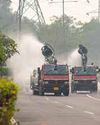Global Plastics Treaty Challenges and Way Forward
TerraGreen
|May 2025
In this article, Arvind Kumar discusses the ongoing global efforts to tackle plastic pollution, specifically the negotiations surrounding the Global Plastics Treaty.
-

Despite significant progress, the 5th session of the Intergovernmental Negotiating Committee (INC-5) in Busan, 2024, failed to finalize the treaty due to disagreements over plastic production and waste management. The article highlights the environmental and climate change implications of plastic pollution and the challenges of balancing economic development with sustainability. It emphasizes the need for global cooperation, with India stressing mutual trust, technical support, and a balanced approach to addressing the issue.
On the heels of contentious 29th session of the Conference of the Parties (COP29) to the United Nations Framework Convention on Climate Change (UNFCCC) held in Baku, on November 11–22, 2024, the Fifth session of the Intergovernmental Negotiating Committee (INC-5) on Plastic Pollution was held from November 25 to December 1, 2024 in Busan, South Korea. INC-5 based on four earlier rounds of negotiations that followed a historic 2022 resolution at the fifth session of the United Nations Environment Assembly held in Nairobi, which set the goal of developing an international legally binding instrument on plastic pollution, including the marine environment.
INC-5 was expected to conclude negotiations on the world’s first legally binding international instrument on plastic pollution, which is more commonly known as the “Global Plastics Treaty.” It was attended by more than 170 countries. INC-5 was sequel to four earlier rounds of negotiations: INC-1: Punta del Este, in November 2022; INC-2: Paris in June 2023; INC-3: Nairobi in November 2023; and INC-4: Ottawa in April 2024.

Dit verhaal komt uit de May 2025-editie van TerraGreen.
Abonneer u op Magzter GOLD voor toegang tot duizenden zorgvuldig samengestelde premiumverhalen en meer dan 9000 tijdschriften en kranten.
Bent u al abonnee? Aanmelden
MEER VERHALEN VAN TerraGreen

TerraGreen
Pollution Rises in Bengaluru Lakes Post Monsoon: Study
A new lake health study, covering three major water bodies in Bengaluru-Ulsoor, Doddabommasandra and Shivapura-has revealed dangerous levels of pollution and a clear link between rapid urbanization and deteriorating water quality.
1 min
November 2025

TerraGreen
Seven-month Fishing Ban Along Three River Mouths in Odisha for Olive Ridley Nesting
In a bid to ensure safe and harmonious mass nesting of Olive Ridley turtles, Odisha has imposed a seven-month fishing ban from November, 2025 to May 31, 2026 at three river mouths along the coastline.
1 min
November 2025

TerraGreen
A New Track Record
Formula 1, long defined by speed, spectacle, and cutting-edge engineering, is now racing towards a different kind of victory—sustainability.
4 mins
November 2025

TerraGreen
Extreme Floods are Slashing Global Rice Yields Faster than Expected
WMO Report Highlights Increasingly Erratic Water Cycle
3 mins
November 2025

TerraGreen
Renewable Energy Adoption and Corporate Sustainability
Future of Responsible Enterprise
5 mins
November 2025

TerraGreen
Nature-based Solutions for Delhi's Pollution Crisis
Delhi's annual struggle with toxic air has become an unfortunate ritual. Each winter, the Air Quality Index (AQI) spikes to hazardous levels often above 300, amid school shut downs, masks returning, and public outrage-only to fade until the next smog season.
1 min
November 2025

TerraGreen
Your Pumpkin Might Be Hiding a Toxic Secret
Pumpkins, squash, zucchini, and other members of the gourd family have a surprising trait-they can take up pollutants from the soil and store them in their edible parts.
1 min
November 2025

TerraGreen
Echoes of Love
Why the Forest Can't Live Without Its Hornbills
4 mins
November 2025

TerraGreen
Forests on the Fence
Can Uttarakhand's Van Panchayats Take Root Again?
6 mins
November 2025

TerraGreen
Sacred Tank, Sinking City The Urban Threat to 'Mini-Kashi'
Nestled amid the urban sprawl of Malabar Hill, Mumbai's Banganga Tank stands as a living relic where myth, memory, and modernity intersect.
4 mins
November 2025
Listen
Translate
Change font size

